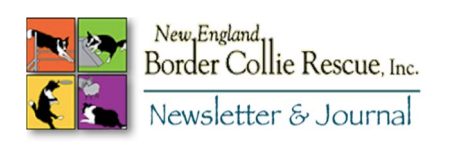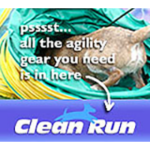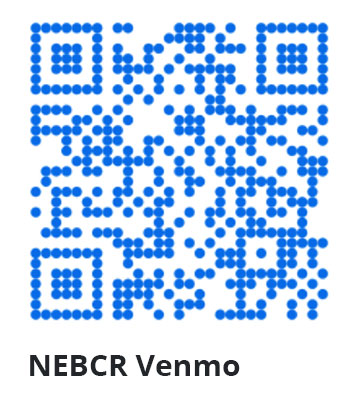Newsletter & Journal 2.7
VOLUME II NUMBER 7
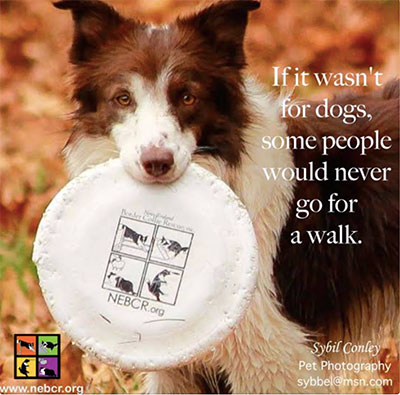
Co-Presidents: Bea Hamm & Sarah Hepburn
Treasurer: Mo Clark
Secretary: Emily Wu
Board of Directors: Monique Fisher, Elise Gouge, Marie Hinds
Website: Rebeca Kerr & Monique Fisher
Editors: Bea Hamm & Rebeca Kerr
Please send your content and pictures to us at: nebcrnewsletter@gmail.com

Featured: Kaylee
Kaylee would like to be the Queen of her castle with occasional playmates.
You’ll find her full bio here.
Our 25th year in rescue fundraiser has reached over 50% of our goal.
Our thanks to all that have brought us this far. If you would like to honor a past or present NEBCR adoptee while supporting NEBCR follow this link.
Introducing NEBCR Member Rebeca Kerr
Growing up, our home was filled with all sorts of pets: parrots, fish, hamsters, squirrels, tortoises, cats, and of course, dogs. I was that little girl who brought home every abandoned dog I could find, mange and all. Inevitably, my mother would ask me to immediately and permanently relocate said hapless creature. “I’m going to be a vet!” I’d quickly say—but as life would have it, I ended up earning my doctorate in Microbiology and Immunology instead.
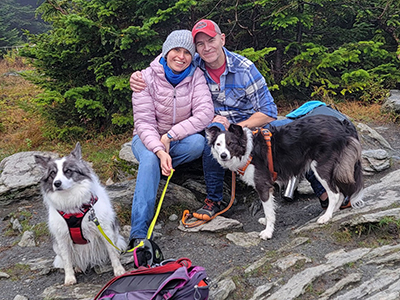
Years later, our two boys were older, and I switched career paths to begin working from home as a software developer. We reached a point where adding a dog to our family felt right. That’s when we welcomed Brian, our beautiful Golden Retriever. Sweet, playful, and loving, she was our kids’ “growing up” dog. In 2018, at the age of 9.5 years, Brian passed away unexpectedly. Given the suddenness and heartbreak of her passing, we decided to consider a different breed.
After much research and reading numerous books about raising puppies, breed-specific behaviors, dog sports, and training methods, I fell deeply in love with Border Collies. I was determined to fully understand the breed and prepare for their energy and intelligence. Well, long story short—we had no idea what we were truly getting into!
We got Mila at nine weeks old. She was the cutest little panda bear we’d ever seen. Her unique blue and white coat, perfectly pricked ears, and captivating slate-blue eyes made her irresistible to everyone we encountered. Mila quickly learned every trick in the book with astonishing speed and precision. Keeping pace with her boundless energy and intelligence pushed me to continuously read, learn, and discover new ways to engage her. Over the past seven years, Mila has taught us more about dogs and their behaviors than I’d learned throughout my entire life. Soon after, sweet Aria joined our family, adding her own unique stories, adventures, and valuable lessons. A good friend had once joked, “Border Collies are like potato chips—you can’t have just one!” and it turns out she was absolutely right.

During the COVID lockdown in 2020, I realized I could do even more for dogs in need. I began by volunteering to rebuild the NEBCR website. Shortly afterward, we moved to a larger home with some land, which gave us the opportunity to foster several puppies and three wonderful Border Collies—including our adopted senior, Bear.
With our boys now grown, much of our time and attention goes to our pups, our work, and our home. I live in Massachusetts with my husband, Ian, who has been a steadfast partner in caring for our fosters and volunteering his technical skills for NEBCR. His calm presence has helped many of our fosters gain the confidence and stability they need to thrive in their forever homes.
These past four years with NEBCR have been filled with rewarding adventures and invaluable experiences. Helping to restore a dog to health and happiness, and working alongside such dedicated volunteers, has been incredibly fulfilling—truly a little girl’s dream come true!
So, You Think You Want a Border Collie?
by Kerry Maloney
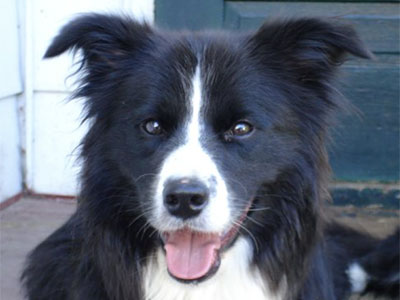
Every border collie I’ve had the pleasure of knowing – whether mine, my foster dogs, or friends’ dogs – have had their own quirks. My first BC, Dublin, was the one to introduce me to the joys of the border collie mind.
Dublin was a great dog in general, and particularly a great dog for a first-time border collie owner. He was generally well-behaved, endlessly patient with my newbie mistakes, was great with people of all ages and abilities which made him a wonderful therapy dog, was a great role model to the many scared foster dogs who came through our lives, very nurturing to puppies, appropriate in his disciple of obnoxious adolescent dogs, and always incredibly respectful (i.e. terrified) of the cats.
He was also a criminal mastermind.
There were signs, of course, when I looked back over the years that he was not always the perfect angel he presented, but as his criminal acts were not too egregious, I always brushed them off as flukes. The first sign was, of course, the incident I wrote about before with the garage can. His ability to understand various mechanical controls was something he developed early on and something I should have kept an eye on.
He also understood rules (he was a border collie after all) but he had an interesting way of interpreting them. When I first started feeding raw, I fed inside in his crate (I later transitioned to outside feeding after a few “incidents”). Dublin knew he was to remain in his crate until he was done eating, and no food was to be brought outside his crate. He apparently interpreted this as I shouldn’t see him bring any food outside his crate, which was not the same thing. I fed him and started doing some chores in the kitchen. I looked over a little while later and he appeared to be done, so I opened the crate. Dublin immediately walked out, looked up at me and then headed to the living room. I was still fairly new to raw feeding at the time and was still figuring out what Dublin liked and would eat. I had given him, among other things, a whole raw egg in the shell to see how he would handle it. I noticed when I was cleaning his crate that there wasn’t even the tiniest piece of eggshell left, which seemed rather odd. Then I realized when Dublin looked up at me, his mouth was closed…so there was a good chance he was smuggling that egg into the other room. I ran into the living room to see Dublin carefully dragging his bed over the smuggled egg. Right up until this point, I could have salvaged things – but I made the mistake of yelling his name, at which point he quickly laid down on the dog bed to cover his crimes and smashed the egg into the floor. Sigh…lesson learned, no more eggs for Dublin.
He was also good at avoiding confrontation when possible. He wasn’t a dog to back down from a fight, but he didn’t go looking for them. So, if a foster dog or one of my other border collies was chewing on a bone or had a toy Dublin wanted, he would run to the back fence and bark furiously at nothing, causing the other dogs to drop what they had and run back to also bark at the fence in solidarity. At which point Dublin would immediately run back to get whatever item he coveted. A few minutes later the rest of the dogs would come back, see Dublin chewing on their bone and find something else to occupy themselves, completely unaware of how they had been manipulated. This always worked. Every. Single. Time. It was genius.
By far, the clearest premediated act of criminality he pulled was a long con. All of my border collies were getting older and one of them was having accidents, things were getting knocked off of counters, food containers were opened, etc. I went back to using crates during the workday. This stopped the accidents, but things were still knocked off of the counters and food containers were still getting opened. At this point, all the evidence pointed to the cat as the culprit (even though the cat had not done this before) as the dogs were clearly not able to do anything from the safety of their crates….right? This had gone on sporadically for almost two years when I discovered the truth. Dublin was 14 years old by then and his hearing was starting to go, which is how I discovered his mischief. Dublin didn’t hear me pull into the driveway one evening so he only knew I was home when he heard me walk up the back porch steps. As I looked through the back door window while getting out my keys, I saw Dublin backing into his crate and pulling his crate door shut behind him until it latched.
I was gob-smacked. He had been letting himself out of the crate and doing whatever he wanted during the day. When I mentioned this to a friend who ran the doggie daycare I sometimes used for my dogs, she wasn’t at all surprised. She said they always had to put a secondary lock on his crate because during “nap” times when all the dogs were crated, Dublin would let himself out and then let out his two border collie buddies – but would NOT let out his “little brother” Limerick. The three border collies would run out back in the play area and have a grand ol’ time. This area couldn’t be seen from the office area, but they would be notified because Limerick would start barking furiously at being left out of the fun.
Gotta love border collies – life is never boring with them around!
Follow your heart… experience the rewards for yourself. If you want to give a deserving dog their second chance at life visit NEBCR.org to read about what fostering entails and to fill out a foster home application.
What Rescue has Meant to Me
By Bea Hamm
Early in life I had this gut feeling I wanted to get involved, give back …….but how? I had many interests, dabbling in them all but not getting that rewarding feeling of truly jumping in with both feet. When Border Collies entered my life then the flood gates opened. It was over 20 years ago now when after much research and thought I landed upon the breed. I knew I would be challenged at finding ways to keep them engaged. Sadly classes in my area at the time were hard to find. In doing an internet search I came upon an event hosted by NEBCR that changed the direction of my life. This event offered demos and “try its” for nearly all the dog sports/obedience I wanted to give a try. My intention was to give different venues a try and see what felt right for my dogs and me.

At this point in my life I hadn’t been involved in rescue in anyway though an avid animal lover. That event opened my eyes and gave me a direction to for fill that yearning feeling I had always experienced. Soon I became a volunteer learning the ins and outs of rescue. Not long after that I began fostering with the support of my fellow volunteers.
Since that time I have fostered many dogs giving them a jump start to their new life. It is so satisfying seeing a dog so mistreated that they fear touch itself blossom into a confident, loving soul. Each foster coming my way I have helped in some way; medical, training or behavioral to prepare them for their new life. Meanwhile while in my care they were busy teaching me as well. Each foster experience built on the last with different issues and temperaments. Each gave me new “tools” for my next foster and other BC owners started seeking me out to trouble shoot issues they had with their BC.
It has been rewarding beyond words to be part of the solution for so many deserving Border Collies. But here is the bonus, knowing that I have been part of making the connection for so many families. These dogs may have been a stray or left behind due to a death in a family but now they become a cherished member of a new family, making someone’s world complete.
Do I still dabble in other ways to give back, I certainly do. Yet I feel truly blessed that all those years ago I followed my heart putting my nerves aside and took the plunge into the world of rescue. My life has been enriched on so many levels. In a world where we sometimes wonder are there any kind hearted truly selfless people out there anymore it is proven to me every day yes there are and many are now my friends.
ASK THE VET: Common Border Collie Health Problems: Diagnosis and Treatment
by Dr. Sarah Hepburn
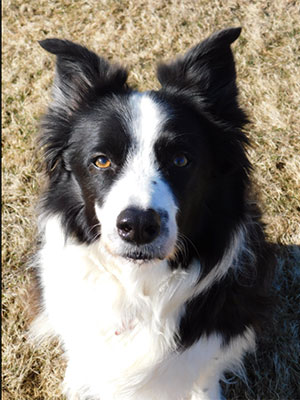
Border Collies are energetic, intelligent dogs prized for their work ethic and loyalty. While generally healthy, they are prone to several genetic and acquired conditions. Early diagnosis and proactive care can significantly improve their quality of life. Below is a detailed look at common health issues in Border Collies, including symptoms, diagnosis, and treatment options.
Hip Dysplasia
Hip dysplasia is a genetic malformation where the ball and socket of the hip joint don’t fit correctly, leading to joint instability and arthritis.
Symptoms: Limping, difficulty standing, reluctance to jump or climb stairs, and reduced activity.
Diagnosis: X-rays under sedation or anesthesia are the most effective way to assess the hip joints. A physical exam may also reveal signs of joint laxity.
Treatment: Mild cases are managed with weight control, joint supplements (glucosamine, chondroitin), physical therapy, and anti-inflammatory medications. Severe cases may require surgery, such as a total hip replacement or femoral head ostectomy (FHO).
Collie Eye Anomaly (CEA)
CEA is a hereditary eye disorder affecting the retina, choroid, and sclera. Severity ranges from mild vision impairment to retinal detachment and blindness.
Symptoms: Often asymptomatic in mild cases. Severe cases may lead to vision loss.
Diagnosis: An ophthalmologic exam by a veterinary eye specialist, usually performed on puppies between 6–8 weeks old.
Treatment: There is no cure. However, many dogs with mild CEA live normal lives. Dogs with severe vision loss adapt well with support from their environment and owners.
Epilepsy
Idiopathic epilepsy is a common neurological disorder causing recurrent seizures.
Symptoms: Seizures may involve sudden collapse, muscle twitching, paddling limbs, or drooling. Dogs usually recover after a few minutes.
Diagnosis: Diagnosis is made by ruling out other causes (e.g., brain tumors, liver disease) through blood work, MRI, and cerebrospinal fluid (CSF) analysis.
Treatment: Lifelong anti-seizure medications such as phenobarbital or potassium bromide. Regular blood tests are required to monitor drug levels.
Progressive Retinal Atrophy (PRA)
PRA is a group of genetic diseases causing gradual degeneration of the retina, leading to blindness.
Symptoms: Night blindness is often the first sign, followed by complete vision loss.
Diagnosis: Veterinary ophthalmologists perform electroretinograms (ERG) and fundoscopic exams to detect retinal changes.
Treatment: No cure exists. Owners can help affected dogs adjust using consistent environments, training, and support.
Deafness
Congenital deafness, especially common in merle-patterned Border Collies, can be partial or complete.
Symptoms: Failure to respond to sounds, disorientation, or excessive barking.
Diagnosis: BAER (Brainstem Auditory Evoked Response) testing is the gold standard for diagnosing deafness.
Treatment:
Deaf dogs can thrive with training based on hand signals, vibrations, or lights. Consistent routines and safety precautions are essential.
Hypothyroidism
Overview:
A condition where the thyroid gland produces insufficient hormones, leading to a slow metabolism.
Symptoms:
Weight gain, lethargy, hair loss, skin infections, and cold intolerance.
Diagnosis:
Blood tests measuring T4 and free T4 levels, along with thyroid-stimulating hormone (TSH).
Treatment: Daily oral thyroid hormone replacement (levothyroxine) is effective. Dogs typically show improvement within weeks.
Preventative Care Tips:
- Choose breeders who perform genetic testing for inherited diseases.
- Schedule regular veterinary exams and maintain vaccination and parasite prevention.
- Feed a balanced diet and ensure your dog gets sufficient exercise.
- Monitor for any changes in behavior, movement, or sensory perception.
With responsible care and early detection, most Border Collies can enjoy long, healthy lives – even with chronic health issues.
TRAINER’S CORNER: DO DOGS GRIEVE?
by Elise Gouge, CPDT, CABC Certified Behavior Consultant & Trainer

Recently, I lost my beloved NEBCR alum Leelah to heart issues. I was asked if my other dogs were acting differently. Did they miss her? This is a common question I am asked as a pet behaviorist.
Grief is a difficult process for anyone, human or canine. It manifests and is handled differently by everyone. For dogs, there is no automatic “pack” or hierarchy and the loss of a resident dog can impact everything…or nothing.
Surprisingly, people still question whether dogs have emotions. If this is a topic that interests you, you can read articles and books by Stanley Coren, Trish McConnell and Marc Bekoff (reference 1). In a study done in 2016, how dogs recognized human emotions was examined and of course results indicated that dogs are highly sensitive and adjust behavior based on their human (reference 2). Grief, specifically, has been studied and results showed that whether or not a dog was grieving was closely connected to the owner’s grief and perception of grief (reference 3).
In short, grief in dogs is a combination of what the owner is going through, as well as an individual, separate experience for the dog. There are dogs that will look for the dog who has passed, will be depressed or lethargic, and will have difficulty functioning as they did before. There are also dogs that are not as deeply affected, but are sensitive to their owner’s grief and therefore seem affected.
How to handle this can be confusing. It’s challenging because you are also dealing with grief. That can include sadness or depression, resentment towards your other dogs for being there when that dog is not, anger, guilt, and regret. Depending on how your dog died, you might also be dealing with trauma symptoms such as insomnia, hypervigilance, inability to concentrate and more. It takes time and emotional healing to get over the death of someone we’ve loved.
For your dog, try to look at their behavior separate from yours. Are they eating as well? Are they listless or refusing to engage in connected activities like fetch or snuggling with you? These can be indications that your dog is struggling with the change of losing a resident dog.
Solutions vary. Some dogs need a period of time on a medication such as an SSRI like fluoxetine to help manage their grief. Others do well with the company of other dogs so they can form new bonds. Most dogs will benefit from keeping routines as predictable as possible. If you see your dog struggling and it causes you distress, then your dog will also become more worried. This is how dogs have evolved to respond to our emotions. You don’t need to fake it, but understanding that grief is normal and not worrying excessively about your dog will be helpful. Attending a grief support group can be helpful and we have many resources here throughout New England (reference 4).
Most importantly, don’t overly focus on the grief but rather the joy of each day we have with them. We all know that our dogs will pass before we do. In many ways, it helps us become better at handling the grief that life brings with the death of human loved ones. As always, our dogs can teach us so much. While we need to notice and honor any grief they may be experiencing as real, it’s also important to appreciate how present they are, how consistent they are in loving unconditionally and how much they have to teach us.
Reunion celebrating 25 years
Come join the fun!
A timely reminder to mark your calendars for NEBCRs Reunion celebrating our 25th year in rescue.
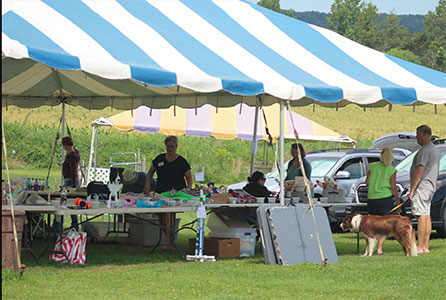
When: Aug. 9 2025
Where: Sugar Bush Farm
760 East Road
Stephentown, NY 12138
Time: 10AM – 3PM
Don’t miss out, always a great time. Demos planned for flyball and extreme disc. Agility and speedway rings will be open for the entire day for use. Our resident trainer/behaviorist Elise will be there too. Grooming/nail trimming station set up. Two fenced areas available, one exclusively for those that don’t do well with other dogs. Lunch will be at noon with a break from activities to socialize and catch up. The NEBCR store will remain open through out the event and with any luck the 2026 calendars will be available. The day will end with the always popular raffle drawing.
In other news, soon we will be releasing a new t-shirt design depicting our 25th year. We are working to make this design available on shirts, hats, mugs, and totes also. These will be available online giving you a much wider range of choices in colors and sizes than we could stock in our store.
*Note Camping on he property is also available for both Friday and Saturday nights with a donation to NEBCR. Restrooms and shower also provided for those with tents.
This event is not open to the general public, you must be a former or present NEBCR adopter or volunteer to attend.
